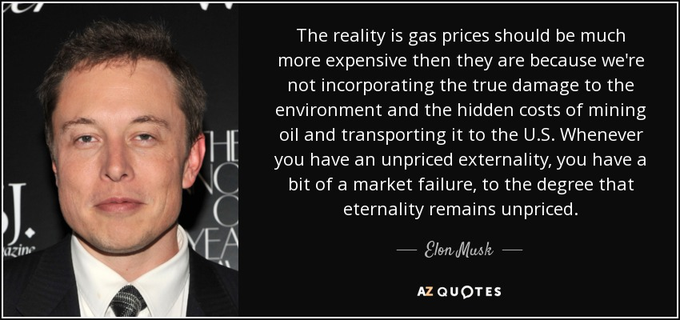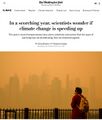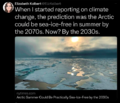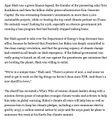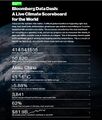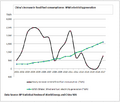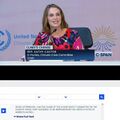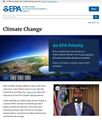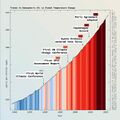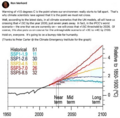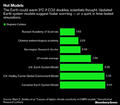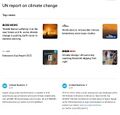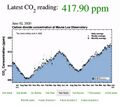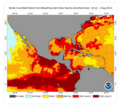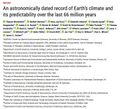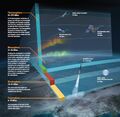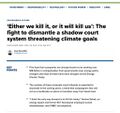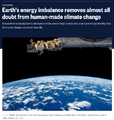Category:Externalities: Difference between revisions
Siterunner (talk | contribs) No edit summary |
Siterunner (talk | contribs) No edit summary |
||
| (26 intermediate revisions by the same user not shown) | |||
| Line 1: | Line 1: | ||
<big>''' | <addthis /> | ||
[[File:Featured.png]] | |||
::[[File:Acting on Climate Change.png]] | |||
SJS/GreenPolicy360 -- We/GreenPolicy360 recommend a new descriptor for emissions-externalities-carbon pricing -- Not a tax, let's call it... | |||
+Emissions Cost... +EC | |||
=='''The By-Products of an Industrial Age'''== | |||
<big><big>'''Externalities - Emissions - Toxic Chemicals'''</big></big> | |||
SJS / Siterunner: A worldwide environmental protection movement that took on dangerous conditions to health, life and the overall environment in which we live gained momentum in the 1960s. The tag "green" was given to these diverse political, business, and educational efforts. Green politics covers a vast array of endeavors and initiatives and your GreenPolicy360 siterunner has participated in green environmental efforts since the mid 1960s, especially in the drafting of the US national Green Party platform and via legislative initiatives with US Congressman [https://www.greenpolicy360.net/w/George_E._Brown_Jr George E. Brown], coalitions and outreach. | |||
An essential component of the US [https://www.greenpolicy360.net/w/Category:Green_Platform Green Platform] that I was charged with drafting. | |||
As drafter of the formative Green political foundation, I put forward policies that would address the costs of global/local emissions and externalities that are human-caused. | |||
Overall, my hope was that more rational, comprehensive [https://www.greenpolicy360.net/w/New_Definitions_of_National_Security definitions of security], of real and sustainable security for nations and communities would motivate actions across the globe to preserve and protect life. | |||
Human responsibility to [https://www.greenpolicy360.net/w/File:You_can_manage_only_what_you_can_measure_Dr_David_Crisp,_OCO-2,_June_2014_m.jpg measure and manage] to avoid harmful and potential tragic consequences is [https://www.greenpolicy360.net/w/File:Earth_in_Human_Hands_Intro.png in our hands]. | |||
Local and far-sighted actions are part of a green vision -- a damage-control mission that focuses on [http://mobile.abc.net.au/news/2017-10-20/world-pollution-deadlier-than-wars-disasters-hunger/9069776 protecting life and health]. | |||
Classic liberal capitalism does not take into account "Externalities" ... These missing costs, [https://www.greenpolicy360.net/w/Environmental_full-cost_accounting an environmental full-cost accounting,] are systemically profound in climate change. | |||
The theory of "The Invisible Hand" does not take into account and factor in to climate change the price of carbon burning activities. | |||
:[[File:Elon Musk quote - gas externality price.png]] | |||
The following page, identifying externalities, begins to capture some of these new visions and ideas. | |||
As business and politics moves into the 21st century we must advanced our awareness of full-cost eco-nomics. | |||
For three decades, as environmental advocates, we have pressed green discussion/debate and decision-making. | |||
Now is the time to recognize the scope of the challenge and to act together across boundaries, cooperatively. | |||
<big>○</big> | |||
<big>'''Environmental full-cost accounting, Climate change and politics'''</big> | |||
[https://www.greenpolicy360.net/w/File:True-cost_pricing_and_sustainability_excerpt_from_US_Green_Party_Platform_2000.png True-cost pricing position from the founding US Green Party Platform] | |||
<big>'''Environmental full-cost accounting @GreenPolicy360'''</big> | |||
http://www.greenpolicy360.net/w/Environmental_full-cost_accounting | http://www.greenpolicy360.net/w/Environmental_full-cost_accounting | ||
'''Triple-bottom line''' | <big><font color=blue>○ ○ ○ ○ ○ ○ ○ ○ ○ ○ ○ ○ ○ ○ ○ ○ ○ ○ ○ ○ ○ ○ ○</font></big> | ||
<big>'''The Challenge of Acting for the Commons'''</big> | |||
* https://www.greenpolicy360.net/w/The_Commons | |||
<big>'''Triple-bottom line'''</big> | |||
* http://www.greenpolicy360.net/w/Triple_Bottom_Line | |||
<big><font color=blue>○ ○ ○ ○ ○ ○ ○ ○ ○ ○ ○ ○ ○ ○ ○ ○ ○ ○ ○ ○ ○ ○ ○</font></big> | <big><font color=blue>○ ○ ○ ○ ○ ○ ○ ○ ○ ○ ○ ○ ○ ○ ○ ○ ○ ○ ○ ○ ○ ○ ○</font></big> | ||
| Line 18: | Line 82: | ||
The growing impact of climate change is exposing the key fallacy at the heart of the hydrocarbon economy: Big Oil cannot simply exempt itself from the natural economy governing all things in this closed system called planet Earth... | The growing impact of climate change is exposing the key fallacy at the heart of the hydrocarbon economy: Big Oil cannot simply exempt itself from the natural economy governing all things in this closed system called planet Earth... | ||
http://image.slidesharecdn.com/greatacceleration2015-150115075518-conversion-gate02/95/great-acceleration-2015-1-638.jpg?cb=1431802701 | * http://image.slidesharecdn.com/greatacceleration2015-150115075518-conversion-gate02/95/great-acceleration-2015-1-638.jpg?cb=1431802701 | ||
'''Externalities | '''Externalities, More than a Strange-Sounding Science Term''' | ||
An externality is, according to Investopedia, a "consequence of an economic activity that is experienced by unrelated third parties." And externalities can be either positive or negative. It's easy to identify the positive externalities of the hydrocarbon economy. Oil has powered a higher standard of living for millions of people in the global North. Petrochemicals have generated such an agricultural bounty that the United States alone discards up to 40 percent of the food it produces annually without risking famine - yet. And cheap plastic manufacturing allows even many of the poorest members of rich economies unprecedented access to low-cost consumer goods. | An externality is, according to Investopedia, a "consequence of an economic activity that is experienced by unrelated third parties." And externalities can be either positive or negative. It's easy to identify the positive externalities of the hydrocarbon economy. Oil has powered a higher standard of living for millions of people in the global North. Petrochemicals have generated such an agricultural bounty that the United States alone discards up to 40 percent of the food it produces annually without risking famine - yet. And cheap plastic manufacturing allows even many of the poorest members of rich economies unprecedented access to low-cost consumer goods. | ||
| Line 26: | Line 91: | ||
On the other hand, the hydrocarbon economy has negatively externalized the impact of its business model by emitting greenhouse gases - carbon dioxide, methane, nitrous oxide and fluorinated gases - without ever paying for the actual cost of those emissions insofar as they impact the ecosystems upon which their businesses and, increasingly, the lives of their customers depend... | On the other hand, the hydrocarbon economy has negatively externalized the impact of its business model by emitting greenhouse gases - carbon dioxide, methane, nitrous oxide and fluorinated gases - without ever paying for the actual cost of those emissions insofar as they impact the ecosystems upon which their businesses and, increasingly, the lives of their customers depend... | ||
In 2008, the | '''Market Corrections''' | ||
''In 2008, the environmental thinker Lester Brown wrote about the inherent blindness of the invisible hand. Brown lamented the "fundamental weaknesses" preventing it from incorporating "the indirect costs of producing goods" into market prices and bemoaned the fact that it doesn't "value nature's services properly." In the short term, Brown was right. But he underestimated the power of an even larger "economy" at work in the self-correcting system called "planet Earth." | |||
''In less than a decade, Mother Nature's ever more visible hand emerged as a force punishing the "market inefficiencies" and rampant externalization of the hydrocarbon economy. The best indicator of this correction is the mounting loss of "ecosystem services." These are the common goods upon which human civilization - and, truth be told, all life - depends. Yet, humans simply take them for granted. | |||
''It's the clean, clear water, life-sustaining oxygen and life-giving soil. | |||
It's the | ''It's the carbon-capturing forests and carbon-retaining power of the oceans. | ||
It's the | ''It's the 1/32 of the planet that is arable land. | ||
It's the | ''It's the Arctic region with it crucial permafrost "carbon banks" found in the earth's heretofore frozen regions.'' | ||
'' | ''Permafrost matters because its long-frozen layers safely store greenhouse gases that slowly accumulated over the course of thousands of years. New research estimates a potential $43 trillion global economic impact should those "hundreds of billions" of tons of carbon dioxide and "billions of tons" of methane be released into the atmosphere by the rapidly warming Arctic. As Pacific Standard points out, that bill "isn't a total cost to be spread out over several decades - it's how much we'd have to set aside today to pay for the damage done by melting frozen soil, or permafrost, in the Arctic." And yet more new research shows that Arctic regions are warming twice as fast as the world average because the solar-reflecting properties of the ice and snow are diminishing with each passing year... | ||
''Also diminishing each year are the unparalleled "ecosystem services" of the oceans, forests and other food webs that sustain earth's interwoven fabric of life. Based on calculations by scientists at the United Nations University, the world forfeits a "staggering $6.3 trillion to $10.6 trillion" each year just from land degradation. That's roughly "10-17% of global GDP." What are the services lost? Properly cared for land provides "food, poverty reduction, clean water, climate and disease regulation and nutrients cycling." | |||
''Hydrocarbon-obsessed humans have long ignored these opportunity costs, but Mother Nature factors it all into her bottom line. And we are running a massive budget deficit. That's why tabulating "environmental services" is crucial to understanding the environmental deficit at the core of the hydrocarbon economy - and it's crucial if human beings want to avoid the ultimate bankruptcy of extinction. | |||
''More greenhouse gases equal more warming, equals more carbon released from permafrost, equals less carbon captured by soils, plus oceans equals more warming. On it goes until nature, like theoretically free markets, eventually enforces equilibrium. | |||
''Market corrections are coming...'' | |||
* ''https://www.greenpolicy360.net/w/Eco-nomics'' | |||
* ''https://www.greenpolicy360.net/w/New_Definitions_of_National_Security'' | |||
* ''https://www.greenpolicy360.net/w/The_Commons'' | |||
* ''https://www.greenpolicy360.net/w/Earth_and_Space,_Politics'' | |||
* ''https://www.greenpolicy360.net/w/Earth_Science_Vital_Signs'' | |||
* ''https://www.greenpolicy360.net/w/Time_for_a_Price_on_Carbon'' | |||
* ''https://www.greenpolicy360.net/w/Anthropogenic_climate_disruption_(ACD)'' | |||
○ | |||
[[Category:Anthropocene]] | |||
[[Category:Atmospheric Science]] | |||
[[Category:Citizen Science]] | |||
[[Category:Clean Air]] | |||
[[Category:Clean Water]] | |||
[[Category:Climate Change]] | |||
[[Category:Climate Policy]] | |||
[[Category:Earth Science]] | |||
[[Category:Eco-nomics]] | |||
[[Category:Energy]] | |||
[[Category:Environmental Full-cost Accounting]] | [[Category:Environmental Full-cost Accounting]] | ||
[[Category:Global Warming]] | |||
[[Category:Planet Citizens]] | |||
[[Category:Planet Citizens, Planet Scientists]] | |||
[[Category:Plastic Pollution]] | |||
[[Category:Radioactive Pollution]] | |||
[[Category:Business Regulations]] | |||
[[Category:Environmental Protection]] | |||
[[Category:Green Business]] | |||
[[Category:Green Politics]] | |||
[[Category:Pollution]] | |||
[[Category:Renewable Energy]] | |||
[[Category:Resilience]] | |||
[[Category:Recycling]] | |||
[[Category:Sustainability]] | |||
[[Category:Topic]] | |||
Revision as of 18:24, 28 September 2019
<addthis />
SJS/GreenPolicy360 -- We/GreenPolicy360 recommend a new descriptor for emissions-externalities-carbon pricing -- Not a tax, let's call it...
+Emissions Cost... +EC
The By-Products of an Industrial Age
Externalities - Emissions - Toxic Chemicals
SJS / Siterunner: A worldwide environmental protection movement that took on dangerous conditions to health, life and the overall environment in which we live gained momentum in the 1960s. The tag "green" was given to these diverse political, business, and educational efforts. Green politics covers a vast array of endeavors and initiatives and your GreenPolicy360 siterunner has participated in green environmental efforts since the mid 1960s, especially in the drafting of the US national Green Party platform and via legislative initiatives with US Congressman George E. Brown, coalitions and outreach.
An essential component of the US Green Platform that I was charged with drafting.
As drafter of the formative Green political foundation, I put forward policies that would address the costs of global/local emissions and externalities that are human-caused.
Overall, my hope was that more rational, comprehensive definitions of security, of real and sustainable security for nations and communities would motivate actions across the globe to preserve and protect life.
Human responsibility to measure and manage to avoid harmful and potential tragic consequences is in our hands.
Local and far-sighted actions are part of a green vision -- a damage-control mission that focuses on protecting life and health.
Classic liberal capitalism does not take into account "Externalities" ... These missing costs, an environmental full-cost accounting, are systemically profound in climate change.
The theory of "The Invisible Hand" does not take into account and factor in to climate change the price of carbon burning activities.
The following page, identifying externalities, begins to capture some of these new visions and ideas.
As business and politics moves into the 21st century we must advanced our awareness of full-cost eco-nomics.
For three decades, as environmental advocates, we have pressed green discussion/debate and decision-making.
Now is the time to recognize the scope of the challenge and to act together across boundaries, cooperatively.
○
Environmental full-cost accounting, Climate change and politics
True-cost pricing position from the founding US Green Party Platform
Environmental full-cost accounting @GreenPolicy360
http://www.greenpolicy360.net/w/Environmental_full-cost_accounting
○ ○ ○ ○ ○ ○ ○ ○ ○ ○ ○ ○ ○ ○ ○ ○ ○ ○ ○ ○ ○ ○ ○
The Challenge of Acting for the Commons
Triple-bottom line
○ ○ ○ ○ ○ ○ ○ ○ ○ ○ ○ ○ ○ ○ ○ ○ ○ ○ ○ ○ ○ ○ ○
Nature's 'Invisible Hand'
Mother Nature's Invisible Hand Strikes Back Against the Carbon Economy
The growing impact of climate change is exposing the key fallacy at the heart of the hydrocarbon economy: Big Oil cannot simply exempt itself from the natural economy governing all things in this closed system called planet Earth...
Externalities, More than a Strange-Sounding Science Term
An externality is, according to Investopedia, a "consequence of an economic activity that is experienced by unrelated third parties." And externalities can be either positive or negative. It's easy to identify the positive externalities of the hydrocarbon economy. Oil has powered a higher standard of living for millions of people in the global North. Petrochemicals have generated such an agricultural bounty that the United States alone discards up to 40 percent of the food it produces annually without risking famine - yet. And cheap plastic manufacturing allows even many of the poorest members of rich economies unprecedented access to low-cost consumer goods.
On the other hand, the hydrocarbon economy has negatively externalized the impact of its business model by emitting greenhouse gases - carbon dioxide, methane, nitrous oxide and fluorinated gases - without ever paying for the actual cost of those emissions insofar as they impact the ecosystems upon which their businesses and, increasingly, the lives of their customers depend...
Market Corrections
In 2008, the environmental thinker Lester Brown wrote about the inherent blindness of the invisible hand. Brown lamented the "fundamental weaknesses" preventing it from incorporating "the indirect costs of producing goods" into market prices and bemoaned the fact that it doesn't "value nature's services properly." In the short term, Brown was right. But he underestimated the power of an even larger "economy" at work in the self-correcting system called "planet Earth."
In less than a decade, Mother Nature's ever more visible hand emerged as a force punishing the "market inefficiencies" and rampant externalization of the hydrocarbon economy. The best indicator of this correction is the mounting loss of "ecosystem services." These are the common goods upon which human civilization - and, truth be told, all life - depends. Yet, humans simply take them for granted.
It's the clean, clear water, life-sustaining oxygen and life-giving soil.
It's the carbon-capturing forests and carbon-retaining power of the oceans.
It's the 1/32 of the planet that is arable land.
It's the Arctic region with it crucial permafrost "carbon banks" found in the earth's heretofore frozen regions.
Permafrost matters because its long-frozen layers safely store greenhouse gases that slowly accumulated over the course of thousands of years. New research estimates a potential $43 trillion global economic impact should those "hundreds of billions" of tons of carbon dioxide and "billions of tons" of methane be released into the atmosphere by the rapidly warming Arctic. As Pacific Standard points out, that bill "isn't a total cost to be spread out over several decades - it's how much we'd have to set aside today to pay for the damage done by melting frozen soil, or permafrost, in the Arctic." And yet more new research shows that Arctic regions are warming twice as fast as the world average because the solar-reflecting properties of the ice and snow are diminishing with each passing year...
Also diminishing each year are the unparalleled "ecosystem services" of the oceans, forests and other food webs that sustain earth's interwoven fabric of life. Based on calculations by scientists at the United Nations University, the world forfeits a "staggering $6.3 trillion to $10.6 trillion" each year just from land degradation. That's roughly "10-17% of global GDP." What are the services lost? Properly cared for land provides "food, poverty reduction, clean water, climate and disease regulation and nutrients cycling."
Hydrocarbon-obsessed humans have long ignored these opportunity costs, but Mother Nature factors it all into her bottom line. And we are running a massive budget deficit. That's why tabulating "environmental services" is crucial to understanding the environmental deficit at the core of the hydrocarbon economy - and it's crucial if human beings want to avoid the ultimate bankruptcy of extinction.
More greenhouse gases equal more warming, equals more carbon released from permafrost, equals less carbon captured by soils, plus oceans equals more warming. On it goes until nature, like theoretically free markets, eventually enforces equilibrium.
Market corrections are coming...
○
Subcategories
This category has the following 15 subcategories, out of 15 total.
Pages in category "Externalities"
The following 76 pages are in this category, out of 76 total.
A
C
- C40 Cities Climate Leadership Group
- California Global Warming Solutions Act
- California is ahead of the game as Obama releases Clean Power Plan
- California out in front in a Green future
- Capitalism and the Environment
- Citizen Science
- Climate Desk
- Climate News
- Climate News Events Archive ... 1970 to Today
- Climate Plans Enforcement - Resources
- Climate Problems, Climate Solutions
E
- Each of us can make a positive difference
- Earth and Space, Politics
- Earth Day Summit - April 22 2021
- Earth from NASA
- Earth Science
- Earth Science Research from Space
- Earth Science Vital Signs
- Environmental full-cost accounting
- Environmental Protection Agency
- EOS eco Operating System
- ESA Living Planet Announcement - May 2022
- European Union Green Deal - Fit for 55
F
G
- Glasgow Climate Summit - Pledges, Promises, Declarations - What's Next Up
- GP360 NewPages
- Green Quotes
- Green Stories of the Day
- Green Stories of the Day - GreenPolicy360 Archive
- GreenPolicy360 Archive Highlights 2013
- GreenPolicy360 Archive Highlights 2014
- GreenPolicy360 Archive Highlights 2015
- GreenPolicy360 Archive Highlights 2016
- GreenPolicy360 Archive Highlights 2017
- GreenPolicy360 Archive Highlights 2018
- GreenPolicy360 Archive Highlights 2019
- GreenPolicy360 Archive Highlights 2020
- GreenPolicy360 Archive Highlights 2023
- GreenPolicy360 Highlights
I
T
U
W
Media in category "Externalities"
The following 200 files are in this category, out of 581 total.
(previous page) (next page)- 'Thin Blue Layer' of Earth's Atmosphere 2.jpg 800 × 486; 46 KB
- 'Thin Blue Layer' of Earth's Atmosphere xl.jpg 1,152 × 648; 79 KB
- 2020 record temperatures.png 800 × 502; 358 KB
- 5 19 14 andrew antarcticaelevationchanges-640x547.jpg 640 × 547; 59 KB
- 7-20-2020 GreenPolicy360 RT No.2.jpg 591 × 510; 125 KB
- A Flash of Green by John D. MacDonald.jpg 400 × 400; 55 KB
- A scorching year, what about the 360 warming data.jpg 600 × 706; 106 KB
- Above Earth .jpg 2,000 × 1,500; 278 KB
- Acceptance on behalf of the United States of America.png 448 × 306; 62 KB
- Act now for a livable future.png 501 × 275; 272 KB
- Ag production and GHG emissions.jpg 680 × 510; 33 KB
- Air Pollution Kills, Injures, Cripples, Disables.jpg 600 × 697; 153 KB
- Air pollution moves globally.png 620 × 412; 256 KB
- Alaska Willow - March 12 2023.png 576 × 230; 99 KB
- Alaska Willow News-March 12 2023.png 576 × 625; 235 KB
- Amazon fires burn across the rainforest.jpg 800 × 504; 76 KB
- Anthro-transport via globaia.org.jpg 800 × 450; 444 KB
- Anthropocene bks016.png 800 × 248; 227 KB
- Anthropocene-550x360.png 550 × 360; 335 KB
- Anthropocene-crutzen.jpg 628 × 347; 79 KB
- Anthropocene-economist cover.jpg 750 × 320; 223 KB
- Anthropocene-nature March2015.jpg 747 × 407; 103 KB
- Anthropocene-the-geology-of-humanity.jpg 628 × 347; 79 KB
- AOC re climate task force - july 8 2020.jpg 585 × 203; 38 KB
- Apple varietals.jpg 600 × 314; 30 KB
- April 28, 2016.png 586 × 415; 159 KB
- Aquifers global earth observations by grace20150616-16 m.jpg 800 × 450; 117 KB
- Aquifers global earth observations by grace20150616-16.jpg 1,600 × 900; 317 KB
- Arctic - Kolbert - 2023.png 553 × 476; 274 KB
- Arctic 30.1 C at 62.5 N.jpg 800 × 432; 80 KB
- Arctic heat in Russia-Siberia 2020.gif 784 × 408; 3.6 MB
- Arctic Melt - 1950-2020.png 640 × 349; 287 KB
- Arctic sea ice watch 25 yrs of ice cover change.png 697 × 386; 314 KB
- Arctic Siberia Heatwave - Again - June 2021.jpg 640 × 360; 83 KB
- Arctic-Siberia-6-20-2020.jpg 478 × 644; 148 KB
- Atmosphere Science.jpg 800 × 600; 45 KB
- Atmospheric Experiment of Humanity.jpg 519 × 574; 201 KB
- AU Too Hot.png 640 × 413; 286 KB
- Banking - finance - climate - Mann-1.jpg 452 × 640; 162 KB
- Banking - finance - climate - Mann-2.jpg 452 × 640; 164 KB
- BantheBag California-OutinFront.png 519 × 715; 449 KB
- Battle for Democracy.jpg 640 × 123; 24 KB
- Bernie Sanders, Senate 2.PNG 800 × 517; 379 KB
- Bernie Sanders, Senate Aug 3.PNG 800 × 518; 388 KB
- Biden - clean energy ambitions.JPG 640 × 334; 31 KB
- Biden announces EV policies - Aug 2021.jpg 600 × 604; 112 KB
- Biden introduces leadership team - Nov 24 2020.jpg 800 × 644; 173 KB
- Biden selects Kerry as special climate envoy.jpg 592 × 505; 87 KB
- Biden urged to act - Oct 18 2021 - The Guardian.png 663 × 600; 497 KB
- Biden's assembled an all-star climate team 4-21-2021.jpg 682 × 732; 309 KB
- Biden-January 27 2021-Environment Day 1-News headlines.jpg 800 × 673; 122 KB
- Biden-January 27 2021-Environment Day 1.jpg 800 × 500; 80 KB
- Biden-Sanders Unity Task Force on Climate.jpg 701 × 780; 139 KB
- Big Chicken.jpg 298 × 450; 35 KB
- Big Oil Rocked by News May 27 2021.jpg 639 × 600; 84 KB
- Big Wobble 2020.jpg 507 × 342; 79 KB
- Bill Nelson on Global Temp Rise and Climate Change.png 640 × 353; 100 KB
- Bill Nye The Planet's on Fire.jpg 800 × 675; 106 KB
- Bloomberg Carbon Clock 10-26-2021 8-47-05 AM EST.png 800 × 195; 356 KB
- Bloomberg Live Climate Data Dashboard.jpg 640 × 756; 156 KB
- Blue Marble photo - Apollo 17.jpg 642 × 605; 129 KB
- BP profit 14 yr high - Aug 2022.png 640 × 212; 63 KB
- Brazil INDC 2015.png 592 × 366; 301 KB
- Breakpoint - Reckoning with America's Environmental Crisis.jpg 329 × 500; 49 KB
- Burst of climate denial as Trump presidency ends.jpg 632 × 604; 92 KB
- California at the forefront of US environmental policies.png 600 × 450; 50 KB
- Car heating and cooling.png 465 × 635; 261 KB
- Carbon Brief - Greenhouse gas levels 2021.png 640 × 436; 292 KB
- Carbon-footprint small or large.jpg 149 × 258; 0 bytes
- Carbon-footprint.jpg 297 × 516; 59 KB
- CASM Citizen Sci Air Monitor EPA.jpg 300 × 225; 59 KB
- CFSV2 world temp July 3, 2023.png 600 × 800; 513 KB
- CH4 graph - 1980-2020.JPG 640 × 446; 22 KB
- Changes in carbon dioxide per 1000 years - via Climate Central.jpg 682 × 424; 34 KB
- China Energy Use-Renewable v Fossil Fuel.png 667 × 565; 29 KB
- China Record Heat - August 2022.png 800 × 1,343; 812 KB
- Christina Korp Earth Day and Apollo 8.jpg 519 × 264; 80 KB
- Citizens Climate Lobby - Save Our Future Act 2021.jpg 518 × 262; 77 KB
- Citizens Climate Lobby - Tampa Bay.jpg 586 × 515; 125 KB
- Climate Action 25th conf in Madrid.jpg 680 × 510; 22 KB
- Climate activist - Steven Schmidt - 1978 on.png 600 × 480; 174 KB
- Climate Books - 2020.jpg 800 × 450; 69 KB
- Climate Change COP27 - Nov 11 2022 US Representatives.jpg 712 × 444; 54 KB
- Climate Change COP27 - Nov 11 Kathy Castor.jpg 712 × 710; 77 KB
- Climate Change from Space - Climate Kit via ESA - 2022.png 800 × 421; 651 KB
- Climate Change US EPA.jpg 600 × 703; 95 KB
- Climate Conferences 1979-2020.jpg 768 × 768; 121 KB
- Climate Crisis - Emily Atkin Heated No. 1.jpg 537 × 453; 61 KB
- Climate Crisis and the Global Green New Deal.jpg 293 × 418; 33 KB
- Climate debate.jpg 493 × 580; 129 KB
- Climate Desk.jpg 390 × 226; 21 KB
- Climate diplomacy is failing - June 2020.jpg 592 × 440; 71 KB
- Climate Emergency Institute - Oct 2022.png 610 × 600; 274 KB
- Climate Emergency Institute -- 2021.jpg 800 × 450; 55 KB
- Climate emergency.jpg 800 × 450; 69 KB
- Climate Goals off course - 2018.png 800 × 556; 214 KB
- Climate Headline News around the World - July 2023.jpg 600 × 704; 151 KB
- Climate Models.png 639 × 558; 123 KB
- Climate News - Oct 28 2022.jpg 626 × 600; 88 KB
- Climate News - United Nations Report - Feb 2022.png 768 × 878; 539 KB
- Climate News Dec 4 2023 in Dubai.png 800 × 1,037; 649 KB
- Climate Plan pledges as Oct6,2015.png 529 × 409; 101 KB
- Climate Plans Enforcement - Resources - GreenPolicy.png 768 × 897; 686 KB
- Climate poll - Florida.png 640 × 267; 36 KB
- Climate strike - Week 171.png 739 × 600; 834 KB
- Climate Strike Around the World - Sep20,2019.jpg 700 × 830; 119 KB
- Climate Summit - Leonardo DiCaprio.png 600 × 663; 521 KB
- Climate Summit live updates - Nov 2 2021.png 751 × 600; 420 KB
- Climate Summit planned-1.jpg 800 × 301; 53 KB
- Climate Summit planned-2.jpg 800 × 187; 31 KB
- Climate Summit planned-3.jpg 800 × 278; 44 KB
- Climate Summit planned-4.jpg 800 × 241; 41 KB
- Climate-Action-Plan-World Bank-2016.png 780 × 6,050; 3.2 MB
- ClimateNewsFlorida.jpg 448 × 191; 36 KB
- CO2 at Mauna Loa data - June 02, 2020 - 417.90 ppm.jpg 640 × 566; 66 KB
- CO2 cumulative emissions 1850 - 2021 - countries.jpg 640 × 462; 211 KB
- CO2 emissions-around-the-world.png 800 × 595; 123 KB
- CO2 global pathways via IPCC AR6 - how will we respond.jpg 800 × 450; 57 KB
- CO2 since 1751.png 640 × 400; 40 KB
- COP26 Climate Summit concludes.jpg 600 × 800; 160 KB
- COP26 concludes - 2.png 648 × 467; 177 KB
- COP26 concludes - 3.png 648 × 713; 416 KB
- COP26 concludes.png 648 × 528; 329 KB
- COP26 in GLASGOW - 31 OCT-12 NOV 2021.jpg 800 × 264; 51 KB
- COP27 'opening speech'.png 640 × 460; 160 KB
- COP28 News - Dec 13 2023.png 800 × 898; 410 KB
- CopernicusEU - Sentinel5P Atmosphere Monitoring Mission - 2.jpg 795 × 1,477; 654 KB
- CopernicusEU - Sentinel5P Atmosphere Monitoring Mission.png 583 × 465; 222 KB
- Coral bleaching - August 2023.png 488 × 430; 261 KB
- Coral bleaching - NOAA - August 2023.png 488 × 338; 201 KB
- Covering Climate Now.jpg 493 × 498; 67 KB
- Cradle of Civilization - and climate change.jpg 640 × 360; 70 KB
- Cradle to Cradle Products Innovation Instit.jpg 600 × 600; 72 KB
- Cyanobacteria Prochlorococcus worldmapping MIT.jpg 473 × 321; 60 KB
- Dated record of Earths climate - Science Report Sept 10 2020.jpg 735 × 669; 192 KB
- Death Valley ... the heat, what its like.jpg 640 × 381; 62 KB
- Defend Our Future 6-1-2020.jpg 585 × 458; 103 KB
- Democratic Climate Plan-Introduced June 2020.jpg 528 × 561; 117 KB
- Democratic National Convention-62 climate speakers.jpg 443 × 407; 57 KB
- Democratic Party Climate Bill - Aug 2022.png 640 × 269; 70 KB
- Democratic Party pres candidates debate in Miami-June 2019.jpg 800 × 534; 124 KB
- Democratic presidential candidates on the Green New Deal.jpg 800 × 359; 57 KB
- Denying human-caused climate change.jpg 639 × 620; 129 KB
- Diesel-smoke-externalities.jpg 220 × 276; 16 KB
- Don't Look Up ....jpg 430 × 543; 172 KB
- Don't Look Up.jpg 800 × 450; 104 KB
- Donald Trump-Jair Bolsonaro-March 2019.jpg 640 × 455; 57 KB
- Dove1 image.jpg 420 × 308; 26 KB
- Drawdown top ten solutions - 2017.png 498 × 654; 179 KB
- Drought Monitor Map - April 2022.png 800 × 459; 238 KB
- DSCOVR EPIC - July 20 2022.png 532 × 612; 315 KB
- Earth AI - Feb 2022.png 482 × 480; 192 KB
- Earth and Space, Politics.png 796 × 765; 349 KB
- Earth Breathing.jpg 800 × 450; 117 KB
- Earth Day 2021 - Climate Summit News-1.jpg 491 × 270; 127 KB
- Earth Day 50 years on.jpg 480 × 548; 107 KB
- Earth in Human Hands Intro.png 622 × 423; 121 KB
- Earth Information Center - 2022 Graphic NASA.png 800 × 981; 868 KB
- Earth Information Center from NASA.jpg 800 × 577; 94 KB
- Earth mapped.png 800 × 783; 254 KB
- Earth Observing System - fleet of satellites.png 740 × 576; 557 KB
- Earth POV from the ISS Cupola-m.jpg 800 × 480; 71 KB
- Earth Summit 1992-s.png 336 × 418; 283 KB
- Earth Summit 1992.jpg 600 × 746; 171 KB
- Earth System Observatory-1.jpg 580 × 833; 129 KB
- Earth System Observatory-2.jpg 580 × 831; 69 KB
- Earth System Observatory.jpg 457 × 338; 47 KB
- Earth trapping unprecedented amount of heat - NASA.jpg 468 × 373; 56 KB
- Earth Viewing from the International Space Station.jpg 496 × 307; 45 KB
- Earth-upper-atmosphere-NASA.jpg 800 × 781; 327 KB
- EarthDecadel Priorities-2018.jpg 779 × 529; 85 KB
- Earths two lungs.png 336 × 336; 130 KB
- EarthScience Missions via the EOS - 2022.png 800 × 219; 139 KB
- ECO-NOMICS guidelines.jpg 419 × 131; 34 KB
- Economist.com global capital snapshot as of July 2020.jpg 800 × 477; 119 KB
- Ecostress Mission-Aug 2020.jpg 640 × 311; 85 KB
- EDF satellite - methane tracking.png 600 × 674; 388 KB
- Einstein - the whole of nature 1.PNG 444 × 619; 216 KB
- Einstein - the whole of nature 2.JPG 680 × 623; 110 KB
- Elon Musk quote - gas externality price.png 680 × 320; 199 KB
- Energy - Electric Measuring and Monitoring.png 715 × 1,978; 862 KB
- Energy Charter Treaty.jpg 512 × 480; 74 KB
- Energy Imbalance, Climate Change - Aug 1 2021.png 640 × 672; 394 KB
- Environmental laws in US - Supreme Court votes soon.png 800 × 414; 334 KB
- ESA Living Planet Symposium - Announcement.png 637 × 600; 508 KB
- ESA Living Planet Symposium - May 2022.png 700 × 600; 258 KB
- ESG Fight - Feb 2023.png 396 × 194; 88 KB
- Estuary in Clearwater on Tampa Bay.jpg 3,584 × 2,016; 1.5 MB
- EU agrees to cut emissions 55 percent by 2030.jpg 800 × 558; 96 KB
- EU unveils new climate change policy - July 14 2021 - 1.jpg 800 × 234; 33 KB
- EU unveils new climate change policy - July 14 2021 - 2.jpg 800 × 552; 86 KB
- Anthropocene
- Atmospheric Science
- Citizen Science
- Clean Air
- Clean Water
- Climate Change
- Climate Policy
- Earth Science
- Eco-nomics
- Energy
- Environmental Full-cost Accounting
- Global Warming
- Planet Citizens
- Planet Citizens, Planet Scientists
- Plastic Pollution
- Radioactive Pollution
- Business Regulations
- Environmental Protection
- Green Business
- Green Politics
- Pollution
- Renewable Energy
- Resilience
- Recycling
- Sustainability
- Topic


